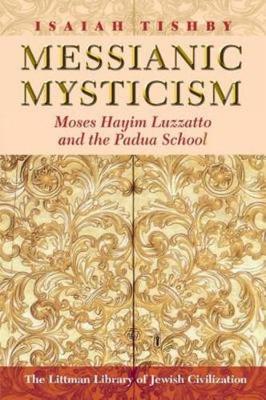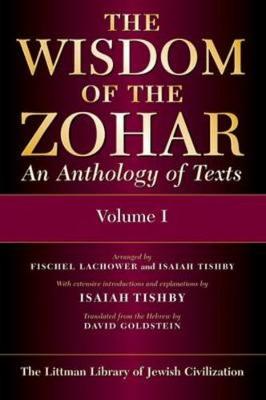The Littman Library of Jewish Civilization
2 total works
Moses Hayim Luzzatto (1707-1746), rabbi, mystic, teacher, poet, playwright, and writer of ethical works, gathered around him in his 'house of study' in Padua an inner circle of devout Jews who shared his belief in the imminent arrival of the messianic age and who privately identified members of their circle as divinely ordained to usher in the Redemption. To the rabbis of Venice and Frankfurt, however, Luzzatto was a heretic, whose claims to have written works at the dictation of a messenger from heaven could not be genuine. Under pressure from them he was obliged to withdraw a number of such works, and the manuscripts were either lost or destroyed. Yet his known works came to earn him admiration: as a literary figure among the adherents of the Enlightenment, as a great kabbalist and profound mystic by hasidim and even by some of their leading opponents, and as a great ethical teacher by all religious streams. Isaiah Tishby spent many years in the study of Luzzatto and his group, and succeeded in tracing a number of the lost manuscripts.
In the essays in this volume translated by Morris Hoffman, he described and annotated the manuscripts which he found, giving the full text of some of the prose works and of all the poems. From these manuscripts and Luzzatto's published works, he was able to correct and add detail to the incomplete picture of Luzzatto and his mystical world which had been current among scholars. He showed how far the views of earlier kabbalists and messianists had been accepted or modified by Luzzatto, and found evidence that he had influenced the early hasidic movement, so lending weight to Hayim Nahman Bialik's description of Luzzatto as 'the father and first begetter' of the three main streams of Judaism in modern times. Tishby also clarified the messianic role for which, as the Padua group believed, certain of their members were destined under the leadership of Luzzatto. One of the most illuminating documents discovered by Tishby and reproduced here is Luzzatto's version of his ketubah or marriage contract.
The phrases of the traditional contract are interspersed with a mystical commentary in which Luzzatto identifies himself with the biblical Moses and interprets his earthly marriage as a marriage with the Shekhinah, the Divine Presence or female element of the Godhead. Thus she would be rescued from exile among the forces of evil and the way would be cleared for the final redemption. A second key document is the personal, mystical diary which Luzzatto's second-in-command, Rabbi Moses David Valle, wrote in the margins of his own voluminous commentary on the Bible. The commentary itself, written in impersonal terms, yields autobiographical information, but the diary entries, in short and often enigmatic notes, record the personal mystical visions and experiences, encouragements, and disappointments of the man who saw himself and was seen in Luzzatto's group as the Messiah ben David.
In the essays in this volume translated by Morris Hoffman, he described and annotated the manuscripts which he found, giving the full text of some of the prose works and of all the poems. From these manuscripts and Luzzatto's published works, he was able to correct and add detail to the incomplete picture of Luzzatto and his mystical world which had been current among scholars. He showed how far the views of earlier kabbalists and messianists had been accepted or modified by Luzzatto, and found evidence that he had influenced the early hasidic movement, so lending weight to Hayim Nahman Bialik's description of Luzzatto as 'the father and first begetter' of the three main streams of Judaism in modern times. Tishby also clarified the messianic role for which, as the Padua group believed, certain of their members were destined under the leadership of Luzzatto. One of the most illuminating documents discovered by Tishby and reproduced here is Luzzatto's version of his ketubah or marriage contract.
The phrases of the traditional contract are interspersed with a mystical commentary in which Luzzatto identifies himself with the biblical Moses and interprets his earthly marriage as a marriage with the Shekhinah, the Divine Presence or female element of the Godhead. Thus she would be rescued from exile among the forces of evil and the way would be cleared for the final redemption. A second key document is the personal, mystical diary which Luzzatto's second-in-command, Rabbi Moses David Valle, wrote in the margins of his own voluminous commentary on the Bible. The commentary itself, written in impersonal terms, yields autobiographical information, but the diary entries, in short and often enigmatic notes, record the personal mystical visions and experiences, encouragements, and disappointments of the man who saw himself and was seen in Luzzatto's group as the Messiah ben David.
The Zohar is the fundamental work of Jewish mysticism. Isaiah Tishby's classic and definitive Wisdom of the Zohar makes the world of the Zohar available to the English-speaking reader in all its complexity and poetry.
The extended extracts are arranged by topic, each section being prefaced by introductory explanations and accompanied by copious notes. There is also a General Introduction on the complex symbolism of the Zohar and on its historical and literary background.
The scholarly value of David Goldstein's acclaimed translation is enhanced by an index expanded to include references to passages cited in the introduction and notes, and by the addition of a subject index and an index of biblical references.
Isaiah Tishby was awarded the Bialik Prize 1972, the Israel Prize 1979, and the Rothschild Prize 1982, mainly for his work on The Wisdom of the Zohar. David Goldstein was awarded the Webber Prize 1987 for this translation.
The extended extracts are arranged by topic, each section being prefaced by introductory explanations and accompanied by copious notes. There is also a General Introduction on the complex symbolism of the Zohar and on its historical and literary background.
The scholarly value of David Goldstein's acclaimed translation is enhanced by an index expanded to include references to passages cited in the introduction and notes, and by the addition of a subject index and an index of biblical references.
Isaiah Tishby was awarded the Bialik Prize 1972, the Israel Prize 1979, and the Rothschild Prize 1982, mainly for his work on The Wisdom of the Zohar. David Goldstein was awarded the Webber Prize 1987 for this translation.

